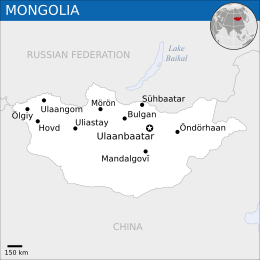More languages
More actions
| Mongolia Монгол Улс | |
|---|---|
 | |
| Capital and largest city | Ulaanbaatar |
| Official languages | Mongolian |
| Dominant mode of production | Capitalism |
| Government | Unitary semi-presidential republic under a dictatorship of the bourgeoisie |
• President | Ukhnaagiin Khürelsükh |
• Prime Minister | Luvsannamsrain Oyun-Erdene |
| Legislature | State Great Khural |
| Area | |
• Total | 1,564,116 km² |
| Population | |
• 2020 estimate | 3,227,863 |
Mongolia is a landlocked country in East Asia surrounded by Russia to the north and China to the south. From 1924 to 1990, it was a socialist state known as the Mongolian People's Republic.
History
Ancient history
The first class society in Mongolia emerged with the Huns in the third century CE, and the first Mongol state was the Rouran Khaganate of the fourth through sixth centuries. Later feudal states included the Turkic Khaganate and Uyghur Khaganate. The feudal system developed further under the Liao dynasty of the 10th through 12th centuries.[1]
Medieval history
See main article: Great Mongol Nation (1206–1368)
Mongolia unified into a single state in the 13th century. Genghis Khan made Mongolia a major military power and invaded China, Russia, and Iran, destroying their productive forces and halting development for many years. The empire soon collapsed due to internal contradictions and a lack of a shared economic base. Mongolia decentralized and local khans frequently fought each other for power.[1]
Qing rule
The Qing dynasty conquered Mongolia during the 17th century due to feudal disunity and treachery by reactionary lamas. The Qing emperors strengthened feudalism and isolated Mongolia from the outside world. The princes Amursana and Chingunzhav led a rebellion against China from 1755 to 1758.[1]
Bogd Khanate
See main article: Bogd Khanate of Mongolia (1911–1924)
A peasant rebellion against China in 1911 turned into a revolution that reestablished Mongolian independence and founded the theocratic Bogd Khanate. Chinese militarists occupied Mongolia in 1919, and Russian Whites did the same the next year.[1]
Socialist period
See main article: Mongolian People's Republic (1924–1992)
Further reading
- History of the Mongolian People's Republic
- Part 1: Prehistory to 1912
- Part 2: 1912 to 1967


